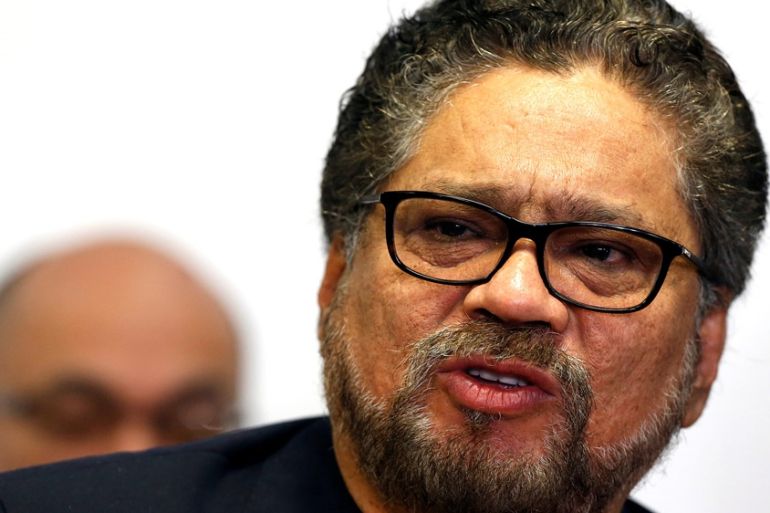Colombia: Ex-FARC commander Marquez says will take up arms again
Ivan Marquez went into hiding last year as he is wanted by US in connection with drugs charges.

Ivan Marquez, a formerly high-ranking commander of the FARC rebel group, has said he is taking up arms again, announcing a “new phase of armed struggle” in Colombia.
In a video released online on Wednesday, Marquez, whose real name is Luciano Arango, stood surrounded by several male and female armed combatants dressed in fatigues.
Keep reading
list of 4 itemsColombia agrees with ELN rebel group to extend truce
Amid uptick in kidnappings, Colombian family receives ‘biggest gift of all’
Her son was killed by the Colombian military. Now, she’s getting an apology
“We announce to the world that the second Marquetalia [birthplace of FARC’s guerrilla movement] has begun under the protection of the universal right that assists all of the peoples of the world to raise arms against oppression,” he said.
A short statement on the FARC’s website accompanied the announcement. There has been no comment from FARC politicians or the Colombian government.
Marquez was one of 10 former FARC commanders who took up positions in Colombia’s congress after the group became a legal political party under a landmark 2016 peace deal.
The deal ended the half-a-century-long conflict between the rebel group and the Colombian government that killed more than 220,000 people and displaced nearly seven million others.
In July 2018, Marquez said he would not take his seat in protest against the arrest of former commander Jesus Santrich, who appeared beside him in the video on Wednesday.
The whereabouts of Santrich and Marquez remain unknown.
Last week, Interpol issued a red notice for Santrich, who the United States wants to be extradited for alleged conspiracy to export 10 tonnes of cocaine.
Santrich, whose name is Seuxis Paucias Hernandez, denies the allegations.
Marquez himself is accused by the US of involvement in drug trafficking. He went into hiding last year shortly after his nephew was arrested and taken to the US to cooperate with the investigators.
Under the peace deal – which required FARC to demobilise – the Special Jurisdiction for Peace (JEP) Tribunal was set up to investigate FARC members for war crimes but progress has so far been slow.
Some former rebels, including Marquez, accuse the government of using drugs charges to “hunt” former rebels who were promised protection under the deal, while others refused to disarm at all and joined dissident wings of the FARC.